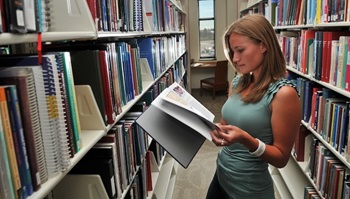Student IP Policy
University of Colorado undergraduates may create various types of intellectual property.
Guidelines are provided to understand your rights in creation of intellectual property (IP), covering software, creative works, educational materials, and patents. CU encourages entrepreneurship and creativity among undergraduates. For more details on your IP rights or university’s ownership in your work, contact the Innovations Office.
 Typically, University of Colorado undergraduates own the software they create. Exceptions include software part of a textbook or program, or developed with CU faculty, staff, or significant CU resources. Such software may fall under CU’s Educational
Materials or Discoveries & Patents policies. University resources do not include course participation, unrestricted funds under $5,000, or common facilities.
Typically, University of Colorado undergraduates own the software they create. Exceptions include software part of a textbook or program, or developed with CU faculty, staff, or significant CU resources. Such software may fall under CU’s Educational
Materials or Discoveries & Patents policies. University resources do not include course participation, unrestricted funds under $5,000, or common facilities.
 Undergraduates at all University of Colorado campuses own their original creative or scholarly works. Exceptions include certain educational materials and software, works created as university employees, works made with significant university resources,
or part of a larger work owned by the university. University resources do not include course participation, unrestricted funds under $5,000, or common facilities.
Undergraduates at all University of Colorado campuses own their original creative or scholarly works. Exceptions include certain educational materials and software, works created as university employees, works made with significant university resources,
or part of a larger work owned by the university. University resources do not include course participation, unrestricted funds under $5,000, or common facilities.
 CU’s policy
binds employed students to university IP rules, except when award terms apply. CU assigns educational material ownership to creators, unless it’s part of a sponsored program, created by non-faculty employees, made with significant resources,
or commissioned. Significant resources exclude course participation, unrestricted funds under $5,000, or common facilities. CU may own student-developed materials under these conditions, otherwise, students own their work unless it’s part
of a larger university-owned work.
CU’s policy
binds employed students to university IP rules, except when award terms apply. CU assigns educational material ownership to creators, unless it’s part of a sponsored program, created by non-faculty employees, made with significant resources,
or commissioned. Significant resources exclude course participation, unrestricted funds under $5,000, or common facilities. CU may own student-developed materials under these conditions, otherwise, students own their work unless it’s part
of a larger university-owned work.
 Ownership and Collaboration: The University does not claim ownership of discoveries created by students solely for course requirements. However, there are exceptions. If students collaborate with someone covered by CU’s Discoveries
& Patents policy or if ownership is necessary for course participation, the University may assert ownership.
Ownership and Collaboration: The University does not claim ownership of discoveries created by students solely for course requirements. However, there are exceptions. If students collaborate with someone covered by CU’s Discoveries
& Patents policy or if ownership is necessary for course participation, the University may assert ownership.Recognition and Royalties: Employed students, award holders, and those using substantial resources are bound by the policy and recognized as inventors. If the University has an interest in a student’s discovery, the student shares in any royalties generated.
Commercialization Management: Innovations oversees the commercialization process for University-owned discoveries.
Student-Driven Commercialization: If the University does not own the discovery, students have the option to participate in the commercialization process or independently follow CU’s licensing guidelines.